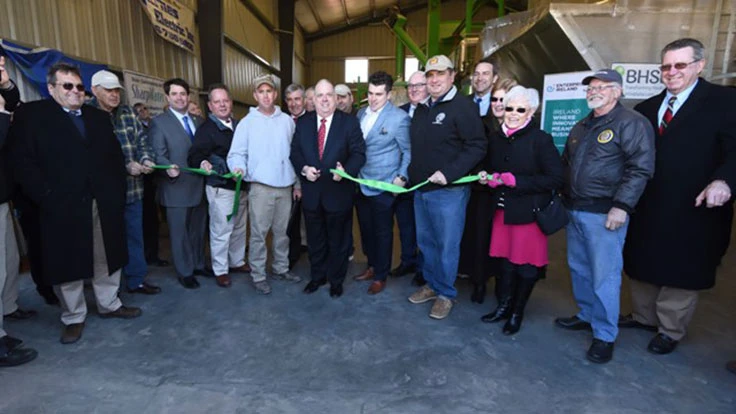
The first Maryland poultry operation to install technology that converts poultry litter to energy recently opened. The Maryland Department of Agriculture awarded a $970,000 animal waste technology grant to Biomass Heating Solutions Inc. (BHSL), based in Ireland, for the manure-to-energy project in Rhodesdale, Maryland, and an additional $139,000 to monitor its operation for one year.
“I am proud to recognize the Murphy family for bringing this innovative technology to Maryland,” says Maryland Governor Hogan. “I commend the Murphy’s and the entire Double Trouble Farm team for leading the way for farmers to improve water quality, increase energy independence and improve animal waste management to ensure the sustainability of animal agriculture in our state.”
Maryland’s Animal Waste Technology Fund is a grant program that provides seed funding to companies that demonstrate innovative technologies to manage or repurpose manure resources. These technologies generate energy from animal manure, reduce on-farm waste streams and repurpose manure by creating marketable fertilizer and other products and by-products. To date, the program has approved $3.7 million in grants to six projects.
“The system uses poultry litter as a feedstock by converting it to energy to heat the farm’s chicken houses and generate electricity,” says Agriculture Secretary Joe Bartenfelder. “A great deal of credit goes to the Murphy family for taking the time and risk involved in being the test case for a promising new way of doing business.”
This project has the following benefits:
- a reduction in the potential environmental impact of manure resources;
- a reduction in energy costs through using heat from the manure as a source for heating poultry houses;
- improved animal welfare, with improved health and reduced risk of diseases;
- faster growth—poultry reaching target weight more quickly; and
- potential expansion of revenue streams—earnings from the sale of excess electricity and a fertilizer by-product.
“I am excited that a unique piece of technology designed in Ireland is going to transform U.S. poultry production and play a crucial role in reducing the environmental impact of the industry on the Chesapeake Bay,” Biomass Heating Solutions Inc. Chairman Denis Brosnan says. “I hope this pilot project is the start of a broader initiative to turn poultry manure from a potential pollutant into a valuable source of energy.”
Biomass Heating Solutions Inc. will use electricity generating technology (fluidized bed combustion) to process poultry litter into energy for heating two of four poultry houses during the demonstration period. The system is projected to generate 526 megawatts of electricity per year. The Murphy’s are working with BHSL to explore markets for the high-phosphorus ash by-product, including Maryland fertilizer companies. As a result of energy production and marketing the ash, 90 percent of nutrients in the poultry litter produced by 14 poultry houses will have alternative uses.
Latest from Waste Today
- Closed Loop Partners receives investment
- Fornnax breaks ground on manufacturing facility
- Meridian contributes to vocational education scholarship fund
- MH Equipment recognized as MVP
- Machinex develops Montreal-Est MRF in collaboration with Éco Entreprises Québec
- Liebherr appoints managing director of Liebherr USA Co.
- Michigan governor proposes increased waste disposal surcharge
- Senate’s EPW Committee passes brownfields, recycling legislation





